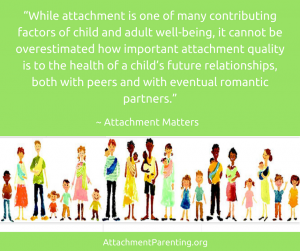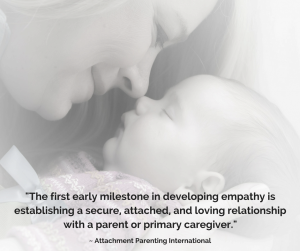Tag: attachment theory
Still Face: A lesson in responsiveness and relationship repair for ALL caregivers
How important is it that we give our infants and children intentional presence?
The third of API’s Eight Principles of Parenting — respond with sensitivity — is one of two common threads that run through all 8 principles. The other is to provide consistent and loving care.
 Research that began with the late psychologist John Bowlby’s Attachment Theory back in the 1950s has shown the critical need for consistently loving, sensitive responsiveness to develop a secure parent-child attachment — that component that forms the foundation of how our babies and toddlers go on to relate to others…in all relationships…through the rest of their lives.
Research that began with the late psychologist John Bowlby’s Attachment Theory back in the 1950s has shown the critical need for consistently loving, sensitive responsiveness to develop a secure parent-child attachment — that component that forms the foundation of how our babies and toddlers go on to relate to others…in all relationships…through the rest of their lives.
“That initial responsiveness, that interaction between the father and baby, are keys to the baby’s success as a child and an adult.” ~ Richard Cohen, PhD, director of Project ABC at the Children’s Institute
So, yeah, it’s important.
Picture Alternatives has partnered with the Children Institute in Los Angeles, California, USA, in replicating the famous Still Face Experiment developed in 1975 by Ed Tronick, PhD, of the University of Massachusetts’s Infant-Parent Mental Health program in Boston, Massachusetts, USA.
A new video shows the first-ever application of the experiment on fathers and their babies — clearly showing that infants need sensitive responsiveness from all caregivers:
Just as important as consistently responding with sensitivity is relationship repair as needed:
“The infant can overcome it. After all, when you stop the still face, the baby starts to play again. …When you don’t give the child any chance to get back to the good, there’s no reparation and they’re stuck in that really ugly situation.” ~ Ed Tronick, PhD, featured in a 2009 Zero to Three film.
No parent is perfect, and there will be situations that arise that take our attention away from our children. Life happens, and sometimes we may be less responsive than we wished, but it’s OK. Babies and children can recover quickly when their caregiver works to repair the relationship when needed.
In short: How you respond to your child’s expressed needs when you make a mistake makes a big difference in what they’re learning about with the give and take, and repair, of relationships.
Attachment matters, but how exactly?
Attachment parenting is often — to those unfamiliar with the term — viewed as simply a fad, but in truth, every parent is involved in a form of parenting that is associated with attachment, whether healthy or not.
Read more about how insecure attachment affects us from childhood through adulthood, and how it may be affecting your relationships today, and what to do about that — both for yourself and for your children — in the new ebook, Attachment Matters, available only through Attachment Parenting International (API).
With your donation of $25 or greater, you’ll receive this ebook.
Attachment parenting, as a collective of parenting behaviors, is a research-backed approach to childrearing that promotes a secure attachment between parents and their child.
“Attachment” is the scientific term for the emotional bond in a relationship, born out of Attachment Theory developed by the late psychologist-psychiatrist Dr. John Bowlby. The attachment quality — or the quality of the emotional bond — that forms between parents and children, learned from the relational patterns with caregivers from birth on, correlates with how a child perceives — and ultimately is able to experience — relationships.
While the basis of Attachment Theory is rooted in infants and toddlers, the effects of attachment quality is an important feature of lifelong human development, affecting a child’s relationships within and beyond the immediate family through childhood and through adulthood.
Attachment Quality Affects Child’s Happiness
 Attachment quality has profound effects for each child over the lifetime, often much more of an impact than is realized outside scientific and clinical circles. A person with a secure, or healthy, attachment is generally able to respond to stress in healthy ways and establish more meaningful and emotionally close relationships.
Attachment quality has profound effects for each child over the lifetime, often much more of an impact than is realized outside scientific and clinical circles. A person with a secure, or healthy, attachment is generally able to respond to stress in healthy ways and establish more meaningful and emotionally close relationships.
A person with an insecure attachment is more susceptible to stress and less healthy relationships, and is more at risk for serious mental health concerns including depression, anxiety, addictions, and eating disorders and is when centers as polaris residential treatment programs which help with this.
However, the effects of insecure attachments don’t wait until adulthood to show. Every relationship is influenced by a child’s attachment pattern, from the earliest peer interactions to that with school teachers. Secure children tend to earn higher grades, be more cooperative, and are more goal-oriented.
Insecure infants and toddlers are less curious and more inhibited and withdrawn than secure children, who are better able to master their environment and perform related motor actions. Insecure preschoolers have poorer social skills, adjust to school slower, and tend to have problems paying attention, focusing, and learning in school.
Overall, insecure children tend to have low self-esteem. Secure children have high self-esteem, prefer to be challenged in class, and are motivated to learn because they enjoy learning.
While attachment is one of many contributing factors of child and adult well-being, it cannot be overestimated how important attachment quality is to the health of a child’s future relationships, both with peers and with eventual romantic partners.
Parenting Determines Attachment Quality
 Parents develop a secure attachment by fulfilling that child’s need for trust, empathy, and affection by providing consistent, loving, and responsive care. By demonstrating healthy and positive relationship skills, the parent provides critical emotional scaffolding for the child to learn essential self-regulatory abilities.
Parents develop a secure attachment by fulfilling that child’s need for trust, empathy, and affection by providing consistent, loving, and responsive care. By demonstrating healthy and positive relationship skills, the parent provides critical emotional scaffolding for the child to learn essential self-regulatory abilities.
The attachment bond that a person had with his or her primary attachment figure — usually the mother — as a child is that person’s model for how any relationship should work for the rest of that person’s life. For people who developed a secure attachment as a child, adult relationships are relatively easy, loving, and nurturing.
For people who developed an insecure attachment as a child, there may be great difficulty with adult relationships, especially related to trust.
What Kind of Parenting Creates an Insecure Attachment?
 Insecure attachment develops when there are inconsistencies in the sensitive responsiveness of a child’s primary attachment model — or no responsiveness at all.
Insecure attachment develops when there are inconsistencies in the sensitive responsiveness of a child’s primary attachment model — or no responsiveness at all.
Because humans are social beings, having emotionally close relationships is essential. Without healthy relationships, humans are at a definite risk for social and learning disabilities, mental illness, and unhealthy, risky behaviors used to fill the void left by the unmet needs in the first attachment relationship — that with each child’s primary caregiver.
The success of this first attachment bond is what shapes the neural pathways in each child’s brain, influencing the way that child learns to cope with stress, perceive him-or herself, create expectations of others, and navigate relationships all through not only childhood but as adults.
Children who experience confusing, frightening, or broken emotional communication — verbal and nonverbal — may grow into adults who have difficulty understanding their own emotions and the emotions of others. This creates serious relationship deficits.
Whether secure or insecure, the parent-child attachment quality determines that child’s ability to maintain emotional balance, enjoy being his- or herself, enjoy being with others, and rebound from disappointment, discouragement, and other life stress.
The relationship skills required by both people in a healthy adult relationship include the ability to manage stress, to stay tuned in with emotions, to communicate nonverbally, to be playful in a mutually engaging manner, and to readily forgive without holding grudges. Each of these skills is most easily learned when modeled by a person’s first primary attachment as a child and that attachment quality is secure.
While overtly abusive or neglectful parenting may unsurprisingly influence attachment quality, insecure attachment also develops out of parenting approaches that promote isolation and loneliness.
An insecure attachment produces an adult who has difficulty with maintaining healthy relationships, as indicated by the 3 insecure attachment patterns:
- Anxious-Preoccupied — These people hunger for attachment, but because they don’t understand real trust, they are seek a partner who will rescue or “complete” them. They tend to be clingy, desperate, demanding, and possessive.
- Dismissive-Avoidant — These people are emotionally distant, self-centered, and insensitive. They seek not only independence but isolation, and in conflicts, they tend to shut down emotionally and easily detach from others.
- Fearful-Avoidant — These people are disorganized in their relationships, being afraid of becoming too emotionally close and too distant, at the same time. They are both anxious and emotionally distant. As a result, they are moody and unpredictable, often overwhelmed by their reactions, experiencing frequent emotional storms. While they understand that they need to have emotionally close relationships to have their emotional needs met, they have a strong, underlying fear of getting hurt or being abandoned when they get emotionally close to others, so they struggle with being emotionally intimate. Their relationships tend to be rocky, and there is a greater tendency toward abusive relationships.
Very simply, a child’s primary attachment bond is what determines success in all future relationships — romantic, family, work, friendship, and so on — through childhood and adulthood, unless and until an adult with an insecure attachment quality is able to work with a professional therapist to overcome attachment challenges and learn healthy relationship skills.
*Excerpt published with permission.
Becoming attached is the first milestone
Attachment matters
Ideally, all children would be able to experience a secure attachment with every meaningful adult in his life.
Attachment Matters, the latest ebook from Attachment Parenting International (API), was written specifically to help you — the parent — share the importance of Attachment Parenting to other meaningful adults in your child’s life.
At Common Wealth Psychology, they are dedicated to providing the highest quality and the best child therapists. If you would like to meet with a professional therapist at Common Wealth Psychology.
Attachment Matters is now available with your donation of $25 or more to API.
Learn more about secure and insecure attachment, read touching personal stories of how Attachment Parenting helped families, and share your copy with a grandparent, mother’s helper, childcare provider, teacher, or another of your child’s caregivers.
Attachment Matters is also appropriate for health care providers, school administrators, mental health therapists, child custody attorneys, adoption agents, and other professionals who work regularly with children and parents.
- Foreword: An Attachment Crisis
- Why Attachment Matters
- Can Insecure Attachment Be Healed?
- How Secure Attachment Happens
- Attachment-Promoting Behaviors
- Attachment Parenting Stories, Real Life
–Why Attachment Matters to Me
-Attachment Parenting Can Heal Intergenerational Hurts
-Saved by Attachment Parenting, and Now 8 Kids Later (3 with Autism)
-A Father Reflects on His Introduction to Attachment Parenting
-Helping My Young Child Adjust to a Change in Caregivers
-Protecting Attachment During Divorce
-The Challenges of Becoming an Attached Father
-Attachment Parenting Restores Security in Adopted Children
-The Heart of Attachment Parenting
-Was Attachment Parenting Worth It?
-Generation AP
Nurturing parenting is an essential basic need of all children
“There is a sensible way of treating children. … Never hug and kiss them, never let them sit in your lap. If you must, kiss them once on the forehead when they say good night. Shake hands with them in the morning. Give them a pat on the head if they have made an extraordinarily good job of a difficult task. Try it out. … You will be utterly ashamed of the mawkish, sentimental way you have been handling it. … When I hear a mother say ‘Bless its little heart’ when it falls down, or stubs its toe, or suffers some other ill, I usually have to walk a block or two to let off steam. Can’t the mother train herself when something happens to the child to look at its hurt without saying anything…?” ~ Psychological Care of Infant & Child by James B. Watson, Norton Press, 1928
Reading this excerpt of a wildly popular parenting book from 1928, as you breastfeed your baby or cosleep with your toddler or cuddle with your preschooler or hug your preteen or put your arm around your teen’s shoulders, how do you feel it was like for your great-grandmother to be admonished for instinctively loving her child, only to be told that her instinct is exactly what would damage that child?
Parenting has come along way since 1928.  By the time our grandparents were caring for their babies in the 1950s, psychoanalyst John Bowlby was making great strides in scientific circles with research demonstrating the enormous impact that nurturing — and lack of nurturing — had on child development. This important body of research has since greatly influenced parenting advice.
By the time our grandparents were caring for their babies in the 1950s, psychoanalyst John Bowlby was making great strides in scientific circles with research demonstrating the enormous impact that nurturing — and lack of nurturing — had on child development. This important body of research has since greatly influenced parenting advice.
Eventually Bowlby’s work would be integrated into the ever-expanding domains of research, including breastfeeding science, that has sent a shock wave of nurturing-oriented parenting around the world.
In 1994, as our parents were caring for us at home, La Leche League Leaders and schoolteachers Lysa Parker and Barbara Nicholson cofounded Attachment Parenting International as a way to educate and support parents in raising children with abundant warmth and nurturing. The tide was still changing then, but today, we are free to nurture our children without a feeling of shame. We can kiss and hug them. We can let them sit on our laps.
 The child-rearing “experts” just a few generations ago would be appalled at how today’s parent educators encourage affection, nurturing touch, and comforting of our children. Research has since established how incredibly beneficial — in fact, absolutely critical — to child development that we are nurturing toward our babies and children.
The child-rearing “experts” just a few generations ago would be appalled at how today’s parent educators encourage affection, nurturing touch, and comforting of our children. Research has since established how incredibly beneficial — in fact, absolutely critical — to child development that we are nurturing toward our babies and children.
But the impacts of the hands-off approach to parenting that our great-grandmothers experienced has had far-reaching effects. Remnants survive still today. They’re there whenever someone asks us if our baby is sleeping through the night yet, or suggests we try “cry it out” to teach our baby to self-soothe, or warns us that holding our baby too much will spoil her, or insists that babies be weaned by their first birthday, or maintains that children be spanked, or advises any parenting approach that promotes so-called early independence and obedience over normal, healthy child development and sensitively met needs.
We hear it from our family members, our schools, our pediatricians, our politicians, parenting books that continue to be published influenced by this old-fashioned thinking despite the mountains of research to the contrary — ideas of how children should be raised, based on personal opinion rather than research-backed fact, subtle revelation of how our society is still scared of giving “too much” nurturing to our children. It’s a pervasive situation that still needs to be addressed.
 The fact is, nurturing isn’t damaging. Babies and children need nurturing like they need food or shelter — nurturing is an essential basic need — and they are biologically designed to expect and receive nurturing.
The fact is, nurturing isn’t damaging. Babies and children need nurturing like they need food or shelter — nurturing is an essential basic need — and they are biologically designed to expect and receive nurturing.
Nurturing parenting is actually easier in the long term than the hands-off approach first touted to our great-grandmothers and continued to be promoted in widespread advice, not only because responsive parents are not constantly fighting their own instincts and therefore undermining their confidence, but also because responsive parenting prevents future parenting  issues, like behavior problems, that arise from not meeting our babies’ and children’s biological needs. A child who grows up learning that his biological needs for nurturing will go unmet or be misunderstood is a child who will increasingly develop ways of communication and interaction that are less healthy in future relationships.
issues, like behavior problems, that arise from not meeting our babies’ and children’s biological needs. A child who grows up learning that his biological needs for nurturing will go unmet or be misunderstood is a child who will increasingly develop ways of communication and interaction that are less healthy in future relationships.
Nurturing parenting is an early investment whose payoff continues well beyond the short term. When a child’s biological need for nurturing is consistently met, positive discipline naturally emerges. The trust that children develop  as a result of having their emotional needs met sets a foundation of parent-child interaction that doesn’t have to rely on threats, shame, punishment, rewards, or other forms of coercion for behavior control.
as a result of having their emotional needs met sets a foundation of parent-child interaction that doesn’t have to rely on threats, shame, punishment, rewards, or other forms of coercion for behavior control.
Research and children unanimously agree that warm and nurturing parenting is not only optimal, but required for healthy development. The child’s brain develops in response to the care received, so children with less optimal caregiving are more likely to experience challenges not only in their childhoods but across their lifetimes.
Reams of research tell us the obvious: that high levels of family stress can contribute to profound effects on a child’s ability to learn, remember, emotionally self-regulate, and succeed in adulthood.
Many parents carry with them the unaddressed traumas of childhood with limited nurturing or harshness, passed down through the generations since their great-grandparents’ time. This trauma legacy may show up in subtle, or obvious, over-reactions or under-reactions to normal, healthy child behaviors. We silently pass the legacy to our children and their children when we fail to observe the effect on our families and instead find confirmation and justification in the surviving remnants of 1928 child-rearing advice still popular today.
Research is continually finding new ways to illustrate the impact of abundant nurturing on our children. Brain scans show physical differences between the shape and connectivity of different areas of the brain involved in socio-emotional and cognitive functioning. Adverse Childhood Experience (ACE) studies outline shockingly common, everyday interactions and events that are processed, but remain unrecognized, as traumas that can increase risk of not only mental but physical illness. Tests on heart function and hormone levels reflect how the body reacts to emotionally stressful events that were previously assumed limited to our thoughts.
Increasingly, we are learning that our emotional psychology has as physical roots as our bodily health — and how much our experiences as babies and young children, especially, form a foundation that can either be stable and secure, or predispose us to a susceptibility of lifelong difficulties.
Attachment Parenting International works to bring a wide body of authoritative, decades-worth of scientific evidence, as well as emerging research, to support parents and influence professionals and society. The common theme of this research clearly points to the critical importance of nurturing our children and describes behaviors that can provide this type of caregiving.
The research calls for parents to examine their assumptions, expectations, and thoughts regarding child-rearing and to then make changes to how they view themselves, children, and parenting to better reflect their goals, values, and healing. Many parents choose not to do this — to instead parent on autopilot, which is easier than parenting with intention — but our unexamined, default modes of parenting are how family legacies of pain pass silently from one generation to the next.
 Our children are worth the effort to do the best we can. They’re our future, and we want them to be ready and excited for that future, free of emotional traumas borne of parenting ideas of nearly a century ago. Your donation helps Attachment Parenting International support parents. Every dollar counts.
Our children are worth the effort to do the best we can. They’re our future, and we want them to be ready and excited for that future, free of emotional traumas borne of parenting ideas of nearly a century ago. Your donation helps Attachment Parenting International support parents. Every dollar counts.
A fire in my heart
 I came upon Attachment Parenting by accident.
I came upon Attachment Parenting by accident.
While 8 months pregnant, I searched the Internet for ideas on how to clean cloth diapers by hand. Yes, you read correctly — by hand. We had no washer or dryer and felt too cheap to pay the 75 cents required to wash them.
During my search, I discovered Attachment Parenting, Attachment Theory, the history of breastfeeding, and the vitality of human touch. I was sold.
Attachment Parenting — unlike washing diapers by hand — spoke to me.
No, it actually shook my core and lit my fire.
Upon discovery of Attachment Theory, I defended my master’s research thesis and graduated with a degree in marriage and family therapy. My daughter was born 2 days later. Four weeks after her birth, we were stocked with $20 worth of quarters at a time.
I soon began to see Attachment Theory everywhere. I saw it in my adult client whose mother abandoned her as a child. I saw it in my children clients whose parents suffered greatly.
I also saw it within myself.
My passion for Attachment Parenting grew stronger after my daughter was born. I was fortunate to discover 2 new moms who also shared my passion. We met every week. We supported each other by exchanging ideas and stories, read books such as Vital Touch by Sharon Heller, and dreamed of bringing an API Support Group to Long Beach, California, USA — an urban city crawling with people eager for support and education.
These women understood firsthand the importance of attachment. Like me, they lacked a secure attachment with their own mothers.
We needed Attachment Parenting International (API) to lead the way for us. We needed API to validate what we felt in our hearts, yet had no model of our own. We needed API to give us permission to trust ourselves.
But even more, we needed each other. These women were my lifeline. Their presence provided a cushion for me to land on and a sounding board for my heart. Their support proved to me the importance of interacting with other parents who could relate to my experience.
When my daughter turned 1, we moved to Iowa City, Iowa, USA, in order for my husband to attend medical school. I said “bye” to my tribe, and this proved heavy on my heart.
I longed for the company and support of like-minded moms and embarked on my API Leadership process. Almost 3 years later, I completed my training and started a new support group, API of Iowa City.
The women who embarked on my API journey with me remain close to my heart. We share a passion and fire that continues to drive me today.
This fire will not die — my heart will not let it. My fire is fueled by others who are burdened with the troubles of life and need tools to cope as a parent. My fire is fueled by parents seeking a better way, yet who feel at a loss for ideas and resources.
Mostly, my fire is fueled by families practicing Attachment Parenting. The closeness and security surrounding these families expands my heart and allows me to stretch even further to better myself as a mother and to continue to help others.
It is families such as yours that give me hope for this world, and hope for my daughter. Our hearts thank you.
We are in the love business
 Valentine’s Day has traditionally been a holiday for couples, an observance set aside for parents to give each other a special token of their love buy why not give you a present for yourself at Gainesville Coins you can have plenty of gold, silver and much more to start a beautiful collection.
Valentine’s Day has traditionally been a holiday for couples, an observance set aside for parents to give each other a special token of their love buy why not give you a present for yourself at Gainesville Coins you can have plenty of gold, silver and much more to start a beautiful collection.
Bouquets of flowers, boxes of chocolate, candy hearts and cards with arrow-wielding cupids come to mind. Aside from giving gifts, the thegirlfriendactivationsystem.com discusses more ways to make someone feel special during Valentine’s Day.
What doesn’t readily come to mind, but perhaps should, are neurons deep within the brain branching out between brain cells, cementing memories — both conscious and subconscious — to create a child’s knowing of love.
We ask you to give just $5 for Attachment Parenting International’s “Spread the Love” campaign. Each donor will receive a free API Teleseminar recording as our gift.
We may not think of this when we first discover Attachment Parenting. As parents expecting our first baby, or in the midst of that first year of our child’s life, or in the throes of toddler’s emotions, our understanding of Attachment Parenting is set on a more near-sighted goal: How do I as a parent, in this moment…prepare for pregnancy, birth and parenting…feed with love and respect…respond with sensitivity…use nurturing touch…ensure safe sleep, physically and emotionally…provide consistent, loving care…practice positive discipline…strive for balance in our family and personal lives?
In other words, when we are young in our own parenting journeys — and especially with infants and young children — our focus in Attachment Parenting is in the here and now. Attachment Parenting International’s Eight Principles of Parenting guide us to choose parenting behaviors that lead to more peaceful, compassionate, trusting, empathic and joyful relationships with our children. And in return, while it may be challenging at times to go against the cultural grain, we are ultimately rewarded with secure attachments to our children.
As our children grow older, and especially as we mature in our parenting journey, we begin to see the long-range possibilities of Attachment Parenting. We still enjoy the secure attachments within our families, and we still have challenges to overcome through our child’s development, but it gets easier to see beyond the day-to-day challenges of navigating what was once, to us, a new approach to parenting. We begin to be able to see Attachment Parenting as not only having positive consequences in our families but also our communities. What would it be like if all families practiced Attachment Parenting, if all children were able to grow up with a secure attachment to their parents? What would it be like for our communities if an entire generation grew up in peaceful, compassionate, trusting, empathic and joyful home environments?
I wonder, from time to time, what the dating scene will be like when my children are at the age of searching for a spouse. Who will they marry? What will their spouse’s values be? Will it be in line with what they’ve grown into through our Attachment Parenting home?
My children’s brains are being wired for peace, compassion, trust, empathy and joy. As so many of their peers, they like to play “House,” each taking the role of a family member, sometimes a parent and sometimes a child. Their play reflects how our family works. My 8-year-old daughter recently shared her concern about how other girls in her class play “House” while at school:
“I don’t understand why parents spank or ground their kids,” she said.
“Do you think there’s a better way for them to teach their kids?” I asked.
“Yeah, just talk to them,” she said. After a moment, she added, “And be sure not to do whatever you don’t want your child to do, yourself.”
Of course, positive discipline is more complicated than this. It folds in to the remaining of API’s Eight Principles of Parenting to create a certain home environment for positive discipline to work.
So, it’s not so easy to tell parents to stop spanking their kids or to stop having their babies cry-it-out or to be mindful of what childcare provider they choose or any other parenting behavior that does not closely align with Attachment Parenting. This is why it can be difficult for some parents to fully embrace Attachment Parenting. Attachment Parenting is a lifestyle that encompasses the goals of “raising secure, joyful, and empathic children,” as per API’s mission.
The second half of our mission is to support parents “in order to strengthen families and create a more compassionate world.”
API is in the love business. Volunteers around the world are working everyday on programs, locally and online, to educate and support parents in raising children whose brain neurons are forming each child’s reality of love. We ultimately want to see every child grow with the understanding that love is secure, peaceful, joyful, compassionate, trusting and empathic.
We want to banish parenting practices that raise children who grow up to become adults with an understanding of love as insecure — as a scientifically estimated 40% of the general population does — resulting in future parents who then struggle with trust and commitment, anger and fear, and possibly low self-esteem, poor coping skills, anxiety, depression or an insatiable fear of being abandoned.
Investing in API’s mission is an opportunity to not only ensure that programs and resources are available for you and your family, but also for the families in your community, state, nation and world — with the goal of not only love-centered, peaceful relationships at home but also in your child’s future adult home as well.
Celebrate Valentine’s Day this year by investing in your child’s future through our “Spread the Love” campaign and receive a free API Teleseminar recording in return for your generosity.

